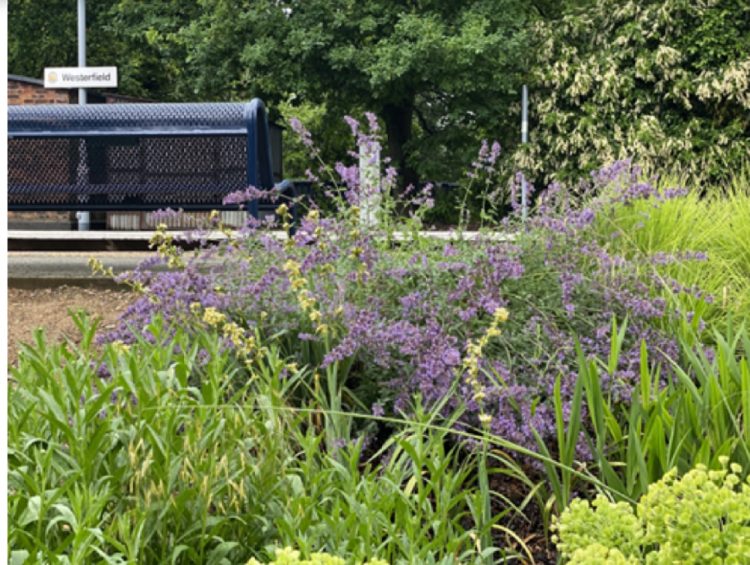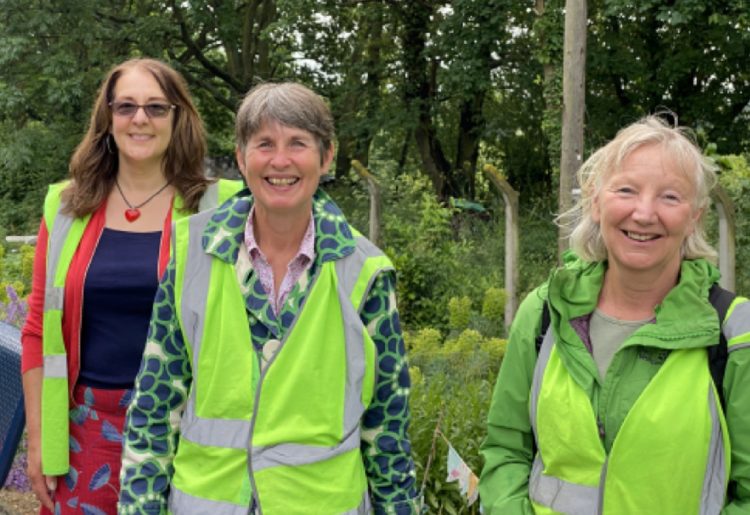In Suffolk‘s Westerfield rail station, local volunteers’ diligent efforts have turned barren land into a flourishing garden and earned them a prestigious national award for their contributions to wildlife preservation.
These ‘station adopter’ volunteers, comprising Sandy Burn, Yvonne Maynard, Laura Hadgraft, and Mary Pluquet, have been working diligently to cultivate an expansive wildlife-friendly garden beside the Westerfield station.
The project has now been honoured with the title of ‘Bees’ Needs Champions’ by the government’s Department for Food and Rural Affairs (DEFRA). Such awards are meant to laud groups and organisations that actively protect pollinators within green spaces.

Over the past few years, the Westerfield station volunteers have methodically transformed the area into a haven for pollinators. The garden was developed in three distinct stages, each with unique characteristics, aiming to foster biodiversity.
- The Pollinator’s Paradise: The first garden area was imbued with a wide range of pollinating plants, strategically designed to ensure that flowers bloom successively. This ongoing bloom guarantees a consistent food source for bees and other insects, crucial for their survival.
- The Wildflower Haven: The second section showcases a small wildflower region planted with both perennial and annual seeds. With flowers blossoming in phases, it provides yet another reliable food supply. Moreover, a mini pond contributed by a community member has become a thriving habitat for creatures such as tadpoles, dragonflies, and birds.
- The Eco-Friendly Sanctuary: The third garden area is themed around sustainable principles like reuse, recycle, recover, and reduce waste. Among its unique features are a large bug habitat with a living sedum roof, dead hedges, and an innovative log arrangement that creates a perfect environment for stag beetles. The garden even includes early bumblebee nests inspired by the Bumblebee Conservation Trust and uses reclaimed materials such as old trunks and branches for constructing raised beds.
The volunteers have ensured an eco-friendly approach by avoiding pesticides, composting green waste, and utilising peat-free compost. They have also connected a water butt to the passenger shelter’s roof to source water.

This project at Westerfield is part of a broader trend within East Anglia, where over 300 volunteers have transformed more than 7,400 square meters of land into verdant wildlife gardens as part of Greater Anglia’s station adoption scheme. The latest survey by these station adopters reported over 200 different species visiting their stations, including a variety of butterflies, bees, slow worms, bats, foxes, toads, lizards, deer, and birds.
In collaboration with the region’s Wildlife Trusts, Greater Anglia has launched the ‘Greater Anglia Wildlife Friendly Stations Accreditation Scheme.’ This initiative formally acknowledges the selfless efforts of the volunteer ‘station adopters,’ who have been instrumental in creating these wildlife oases across the rail network.
This laudable achievement at Westerfield station is a testament to the power of community collaboration and sustainable practices. It showcases how converting mundane spaces into vibrant ecosystems can uplift local communities and contribute to broader environmental stewardship.
Station Adopter Sandy Burn said, “We are absolutely thrilled to be recognised as Bees Needs Champions. We are passionate about conservation and education, so to transform this public area and involve the community is very rewarding. It means that we can provide a visual and memorable experience to people and, at the same time, communicate the need for sustainable gardening practices.
“We are often rewarded with wonderful sights such as bees making their nests, ladybirds hibernating amongst the dead flower heads and many visiting birds and butterflies, and we hope that people find it an interesting and attractive place to visit.”
Alan Neville, Greater Anglia’s Customer and Community Engagement Manager, said, “We are very grateful to the station adopters at Westerfield for the incredible transformation they have carried out, creating a really magical place for rail passengers and wildlife alike and helping the station to become an active contributor to biodiversity locally.”






Responses